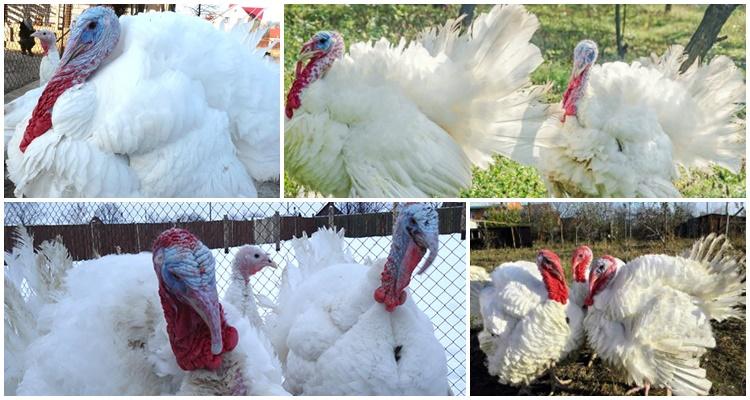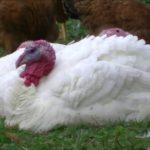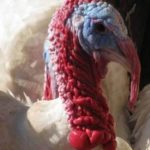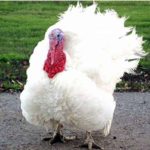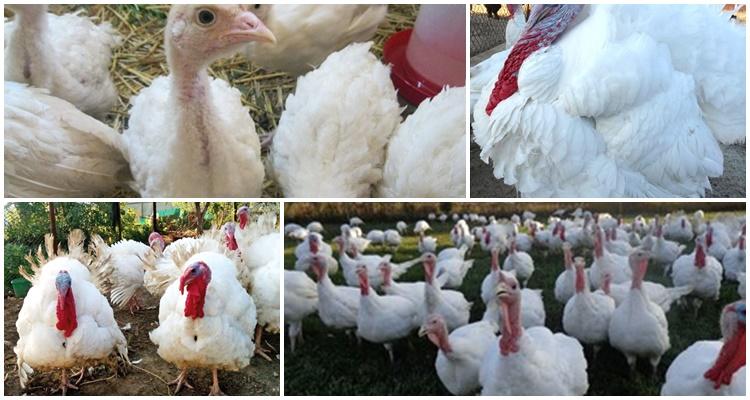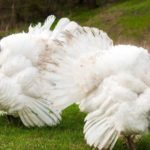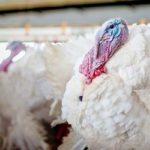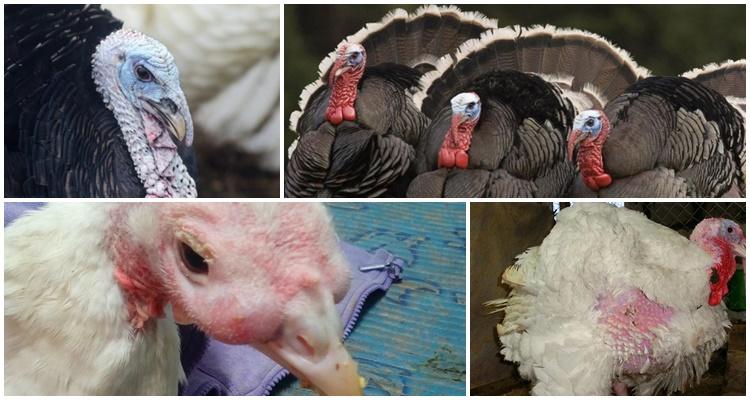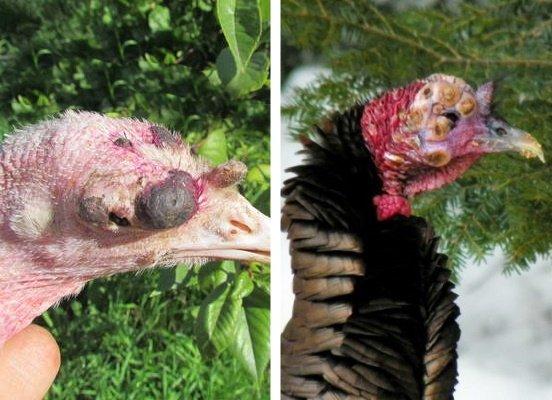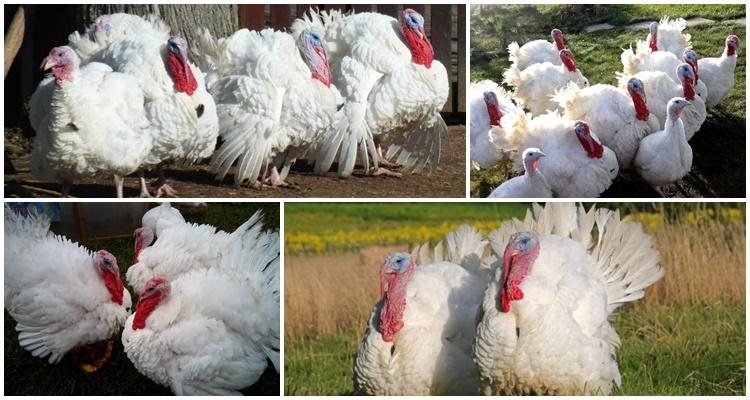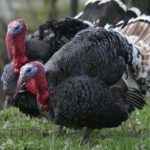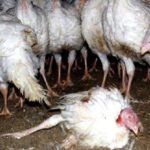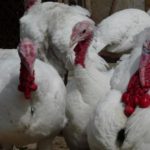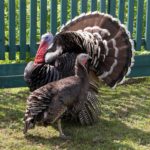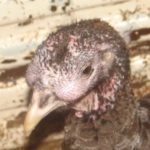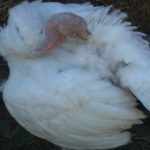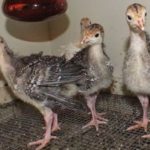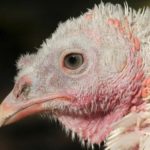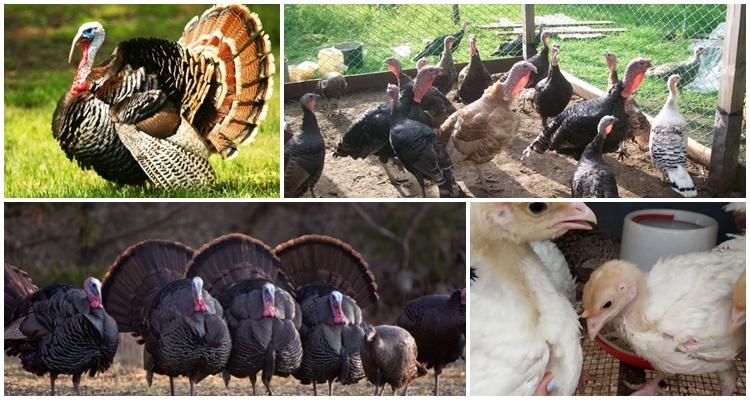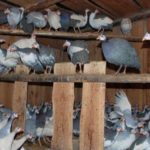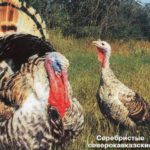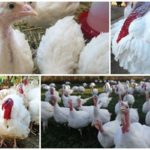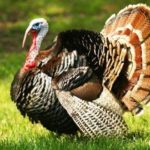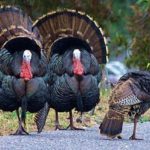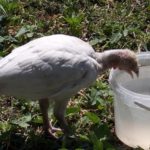Turkeys are disease-prone poultry, susceptible to infection. Infectious and non-infectious pathologies affecting turkey livestock cause enormous damage to poultry farming and make meat unsuitable for sale. Treatment of turkey diseases should be carried out in a timely manner, infection should be detected at the initial stages, and in difficult cases, seek veterinary help in order to prevent a significant reduction in the number of livestock.
- Non-communicable diseases
- saggy goiter
- Hard goiter
- Hypovitaminosis
- Mechanical injuries
- Pica
- Problems with paws
- Infectious diseases of turkeys
- Smallpox
- Newcastle disease
- Worms
- Tuberculosis
- Synovitis
- Respiratory mycoplasmosis
- Coccidiosis
- Diseases of a young individual
- Infectious sinusitis
- Paratyphoid
- Hemophilosis
- Pullorosis (typhoid)
- Histomoniasis
- Diseases of small turkey poults
- Cannibalism (pecking)
- Avitaminosis
- Rickets
- Enteritis
Non-communicable diseases
Non-communicable diseases occur when a farmer does not follow hygiene rules, takes poor care of birds, or provides poor-quality feed.
saggy goiter
The disease is easy to treat. The reasons for the stretching and drooping of the crop are an unbalanced diet, excess water consumption, and birds being in hot weather under direct sun or in an unventilated room. Treatment involves a diet prescribed by a veterinarian. Sick turkeys are kept in silence and privacy, their physical activity and contact with other birds are minimized.
Hard goiter
A more complex disease than the previous one. The crop hardens when it becomes clogged with particulate matter and plant husks. A surgical operation is required, but for many farmers this is unprofitable; it is easier to slaughter sick birds.
Hypovitaminosis
Lack of vitamins is the result of poor-quality feeding. Hypovitaminosis in turkeys manifests itself, like in chickens, with dermatitis, blurred vision, thinning and deformation of the skeleton, and inflammation of the mucous tissues. Treatment involves creating a balanced diet. Sick turkeys are switched to feeding on mixed feed containing a full list of substances necessary for birds of a particular age category.
Mechanical injuries
Most often, turkeys injure their legs, this is manifested by an abnormal gait, eversion of paws, and bending of bones. Symptoms and treatment depend on the cause of the injury.
Causes:
- calcium deficiency and hypovitaminosis;
- inbreeding;
- pathologies of the skeleton and bone tissue;
- crowded housing, which causes pets to step on each other.
If a turkey has a fracture, the limb is fixed with a splint and a plaster cast is applied.
Pica
The reason is a lack of vitamins and minerals in the feed. The disease is often observed in heavy broiler breeds that require a lot of high-quality feed, for example, in English Big-6 turkeys. To replenish deficient substances, pets begin to eat inedible objects: pebbles, sawdust, sand, straw. To eliminate dietary oddities, the farmer must review the birds’ diet and enrich it with vitamins and minerals.
Problems with paws
To correctly determine the cause of leg problems, the farmer must observe the turkeys:
- underdevelopment of the skeleton due to a lack of calcium is manifested by an unstable gait and weakness of the legs;
- when kept in crowded conditions, turkey poults fall, break and twist their limbs;
- an unstable, staggering gait is a sign of a lack of nutrition (if the bird looks normal and behaves actively) or an infectious lesion (if the turkey is lethargic and inactive);
- deformed and swollen joints indicate arthritis.
In the diet, increase the amount of food rich in vitamins D and group B, and reduce the amount of fatty foods. Arthritis is treated with mumiyo solution - 0.4 mg per 100 g of body weight, given to drink for 10 days, regularly rubbed into the inflamed limbs for 5 minutes.
Infectious diseases of turkeys
The infection is dangerous due to its rapid spread and the ability to kill the entire livestock in a short time. Turkeys are susceptible to bacterial, fungal, and viral diseases. At the first signs of infection, the sick individual is separated from the healthy ones and immediately begins treatment.
Smallpox
The incubation period of the viral disease lasts 2-3 weeks.The infection enters the bird's body through the respiratory tract, contaminated food, and open skin injuries. Sick birds are lethargic, their skin is covered with a small rash.
Sick birds are separated from the livestock and their diet is enriched with vitamin supplements to strengthen the immune system. The poultry house and equipment are disinfected. A remedy for treating affected skin is glycerin and an alcohol solution of iodine in equal proportions. The eyes are washed with 2% boric acid.
Newcastle disease
The viral disease affects the nervous system of turkeys. The limbs are paralyzed, the neck twists unnaturally. The bird falls to the ground and defecates gray or greenish-gray smelly diarrhea. Sick birds are killed.
Worms
Helminths enter the body of birds through drinking, food, feces, litter, and soil. Parasites are carried by insects with which turkeys can come into contact. There are no clear symptoms of helminthiasis; laboratory testing is required to clarify the diagnosis. Sick turkeys in most cases:
- lethargic, apathetic;
- suddenly lose weight;
- grow slowly;
- drink a lot of water;
- defecate green diarrhea;
- lose the feather covering at the anus;
- produce eggs with thin, deformed, lumpy shells.
Helminthiasis is treated with the drug Fenbendazole. The medicine is added to the food during morning feeding (7.5 mg per 1 kg of body weight). Birds can be slaughtered half a month after completion of treatment. Prevention of helminthiasis in turkeys - disinfection of the poultry house, regular cleaning of the walking area, removal of bird droppings.
Tuberculosis
Bacterial disease occurs due to poor quality feeding and poor living conditions for turkeys.
Symptoms of avian tuberculosis:
- apathy, lethargy;
- diarrhea;
- poor appetite;
- leg weakness;
- sedentary state;
- nodular rash on the skin.
Sick turkeys are slaughtered.
Synovitis
A bacterial disease, accompanied by inflammation of the synovial tissues of the joints, affects both adult turkeys and chicks from 7 weeks of age.
Symptoms of the disease are expressed:
- apathy;
- sedentary state;
- slowness of movements;
- limping;
- pale skin;
- increased body temperature;
- joints that are unnaturally soft to the touch.
Antibiotics “Streptomycin” and “Biomycin” are used for treatment. A strong, well-nourished bird can recover without medication.
Respiratory mycoplasmosis
Turkeys are affected by mycoplasmas when they are kept crowded and have an unbalanced diet.
Symptoms of the disease:
- discharge from the eyes and nasal passages;
- inflammation of the infraorbital sinuses;
- inflammatory process in the tissues of the beak;
- weakened vision;
- difficulty breathing;
- leg weakness;
- weight loss.
Turkeys are treated with antimicrobial drugs. Very weak birds are killed.
Coccidiosis
Coccidia enter the body of turkeys through food, drink, and through close contact with an infected individual.
Symptoms of the disease:
- depressed and lethargic state;
- baldness;
- rumpled appearance of plumage;
- bloody diarrhea;
- lack of appetite;
- conjunctivitis;
- drooping wings.
Treatment must be started immediately; the mortality rate of young individuals reaches 30%.
Medicines used:
- “Coccidiovit” (2.5 g per 1 kg of food, taken for a week);
- "Aviax" 5% (1 g per 1 kg of food, for 5 days);
- "Avatek" 15% (1 g per 1 kg of food, for 5 days).
Diseases of a young individual
Young turkeys have a weak body, so they suffer from diseases more severely than mature birds.Infectious pathologies are especially dangerous for young animals, threatening the death of the entire livestock.
Infectious sinusitis
A bacterial infection affects the upper respiratory tract. The pathogen spreads with sick individuals, through eggs prepared for breeding, through dirty equipment and shoes of farm workers.
Symptoms:
- apathetic, exhausted state;
- nasal discharge;
- swelling of the oral mucosa;
- hoarse sounds;
- hard breath.
Antibiotics are used for treatment:
- "Streptomycin" (injection 0.1 g per 1 kg of weight);
- "Biomycin" (5 mg in food per 1 kg of body weight, taken for a week);
- "Terramycin" (2 mg in feed per 1 kg of body weight, 2 times a day for 5 days).
Paratyphoid
Salmonella enters the body of turkeys through food, equipment, dirt in the poultry house, with birds and rodent carriers. Mostly young 2-6 week old turkeys get sick.
Symptoms of an acute illness:
- lethargic, inactive state;
- ruffled plumage;
- drooping wings;
- lacrimation, sticking of eyelids with pus;
- birds falling upside down;
- green diarrhea
Either the turkey dies after 2-4 days, or the disease becomes subacute, manifested by inflammation of the joints and respiratory organs, taking the lives of up to 50% of the young livestock. In surviving individuals, after 10 days the pathology takes on a chronic form, accompanied by paralysis of the legs.
Sick turkeys are given immunostimulants, anti-paratyphoid serum is injected intramuscularly (2.5 ml per 1 kg of body weight). The antibiotic Biomycin (5 mg per 1 kg of weight) is added to food for 5 days 2 times a day. Give Furacilin as a drink for 5 days (a solution in a ratio of 1:5000 to water).
Hemophilosis
The upper respiratory tract disease spreads quickly and affects birds up to 3 months of age.Severe symptoms:
- inflammatory processes in the tissues of the beak, pharynx, organs of vision with liquid secretions;
- swelling of the scalp tissues;
- exhaustion;
- lack of appetite;
- hoarse voice;
- hard breath.
Sick turkeys are killed. The rest are treated with iodine monochloride for prophylactic purposes.
Pullorosis (typhoid)
The infection quickly destroys young individuals. The birds squeak pitifully, breathe heavily, and have white, unpleasant-smelling, foamy diarrhea. The infection spreads throughout the body through the blood, killing the digestive tract and respiratory organs. At home, turkeys become infected through food, drink, equipment, and from sick relatives. Infected eggs hatch into sick chicks.
The younger the infected individuals, the more severe the disease. In small chicks, mortality reaches 70%.
For treatment, the veterinarian prescribes an antibiotic. It is better to slaughter completely exhausted birds.
Histomoniasis
The infection affects the tissue of the liver and cecum. Sick turkeys are apathetic, disheveled, refuse to eat, and defecate red, smelly diarrhea that gradually turns brown. Turkeys are treated with the drugs “Furazolidone” (0.04% per serving of feed per day, taken for 2 weeks, after a 2-week break, repeat the course) and “Osarsol” (15 mg per feed per 1 kg of weight, taken for 5 days).
Diseases of small turkey poults
Small turkey poults are susceptible to disease. From the first days of life, if not properly cared for, they can become seriously ill.
Cannibalism (pecking)
At a young age, turkey poults grow actively, their body requires a sufficient amount of nutrients. When there is a protein, vitamin or mineral deficiency, the chicks begin to cruelly peck each other. First, the feathers are plucked, then the skin is pierced, and the entrails are pecked out.But turkey poults suffer from cannibalism not only because of poor nutrition, but also because of:
- open wounds and ulcers in the anal area due to digestive disorders;
- excessive lighting;
- planting new individuals;
- crowded content;
- keeping birds of different ages together (older ones attack younger ones);
- too dry air in the house (the plumage dries out and begins to be plucked);
- parasitic diseases (turkeys peck at the affected itchy areas of the body).
Adult turkeys may peck eggs when they lack protein, calcium or sulfur.
To prevent cannibalism, you must:
- keep turkeys of different ages separately;
- adjust the light level;
- do not allow livestock to be kept crowded;
- provide feed appropriate to the age and production category of turkeys;
- regularly disinfect the poultry house.
Avitaminosis
Symptoms of a lack of different vitamins in chicks manifest themselves differently:
- With a lack of retinol (A), turkey poults’ vision deteriorates, the eyeballs become cloudy, lacrimation occurs, and they gain little body weight.
- With group B deficiency, the limbs become paralyzed. Feathers fall out and dermatological pathologies occur.
- With a lack of calciferol (D), chicks grow poorly. Due to the softening and fragility of bone tissue, the risk of skeletal damage increases.
Rickets
Turkeys and broiler chickens, which need a lot of proteins and minerals, are most susceptible to rickets. But with poor quality nutrition, the disease is also observed in chicks of egg breeds. The main reason is calcium deficiency. But to restore the body, it is not enough just to use a mineral supplement.It is necessary to ensure a sufficient supply of vitamin D, without which the mineral cannot be absorbed. Also, you should not allow excess phosphorus, which contributes to the leaching of calcium from the bones. In order for vitamin D to be absorbed normally, turkey poults must move and take long walks in the fresh air.
Enteritis
The causes of enteritis are poor-quality or spoiled food, lack of vitamins. The disease is usually observed in chicks up to 3 months old. Due to inflammation of the intestinal walls, it is painful for turkey poults to feed, they lose their appetite, and become weaker. They defecate with diarrhea containing undigested pieces of food. The feathers around the anus are covered with feces. Sick chicks should be treated by keeping them separate from healthy chicks. They are placed in a quiet and peaceful place, given high-quality food and clean drink.
If you follow the rules of care and maintenance, quality feeding, and maintaining the immunity of turkeys, the likelihood of disease is significantly reduced. In order for the birds to remain healthy, it is important to carry out preventive measures in a timely manner, not to allow animals or strangers into the poultry house, to carry out disinfection, and to clean equipment.

